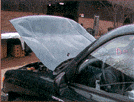
Most people can’t drive. Lucky for you. It keeps you in business. I, however, am a commuter – long on drive, short on patience. Just when I think I’ve seen it all, an even dumber driver comes along. Seventeen-year-olds behind the wheel with a cell phone glued to their ear and their turn signal still on from 10 minutes ago. Mr-Sunday-Drive-In-Rush-Hour-Traffic who’s oblivious to the fact that he’s creating a 60-car traffic jam behind him because he’s lollygagging in the left (passing) lane. Move it or move over! Based on my daily driving encounters, I’m all in favor of establishing IQ prerequisites as part of the requirements for earning a driver’s license.
My point? Most people are clearly “vehicularly challenged” (the PC term) when it comes to holding their own on our city streets and highways. God knows they don’t need anything else to complicate what they perceive as the already-complicated task of driving.
Take, for example, a recent incident in which a body shop tech was test driving a repaired Toyota Tacoma, only to have the CAPA-certified aftermarket (A/M) replacement hood fly open. Despite the high speed at which the truck was going, the tech still somehow managed to escape uninjured after the truck skid and hit a guard rail.
This type of situation – not being able to see while driving – is impossible for a good driver to handle well, let alone all the idiots on the road today. This fact alone is enough reason to conclude that this sort of thing just can’t happen again. Ever. But to figure out how to prevent it – or something worse – we need to examine how it happened in the first place.
Preliminary investigations have determined that the secondary striker on the hood doesn’t work (which comes as no surprise to the tech). And it’s not just this one hood. Apparently none of the hoods made by Jui Li and its manufacturing partners in Taiwan work – a revelation that quickly led to a recall, and later, a decertification of the hood by the Certified Aftermarket Parts Association (CAPA).
Did I say decertification? Why yes I did. Which means, at some point, there was a certification. But how? And if this hood is any indication of the caliber of parts that earns CAPA certification, what other nifty surprises are in store for all of us?
Certification is supposed to mean something. When a label says it’s FDA-approved, you assume it’s been through bureaucratic hell – at least 20 years of testing and $300 million in research and development. You also assume that ingesting it won’t make you grow an 11th toe or a third eye.
CAPA certification should also mean something. If CAPA is what it proclaims to be – an organization that certifies the quality of parts – then repairers should be able to assume that a CAPA-certified A/M part is safe to use and the functional equivalent to the OEM part. As ambiguous as this assumption is, the fact remains that people should be able to depend on a validating organization. If they can’t, then why does the organization exist?
But rather than examining their own processes shortcomings – such as inherently flawed hoods somehow earning certification – CAPA has instead been busy waging a verbal battle (via press release) with the Manufacturers’ Qualification and Validation Program (MQVP) – a newly formed parts-validating organization. CAPA recently released a comparative report on itself and MQVP – not surprisingly, proclaiming its own certification process the better of the two. (Considering some of the parts that earn CAPA-certification, God help us if CAPA really is the better of the two. What the heck is MQVP certifying then?) Not one to turn the other cheek, MQVP quickly retaliated by issuing its own press release.
As repairers grow more and more suspicious of A/M parts (if that’s possible, considering how suspicious many were to begin with), the industry’s only two parts-validating organizations are busy beating each other up in the school yard. They don’t seem to get it. Certified A/M parts need to prove themselves as safe and acceptable alternatives to OE parts before anyone wins.
In theory, parts certification should help you to differentiate between good and bad A/M parts. In reality, however, if you put too much faith in parts certification, you may come to realize the only thing that’s certifiable around here is … you.
Georgina K. Carson
Editor













